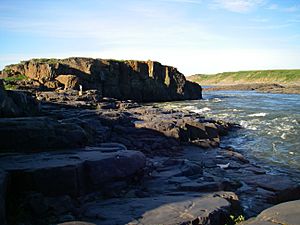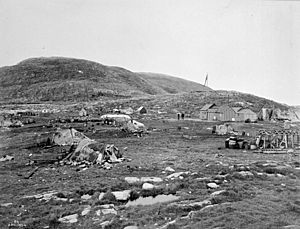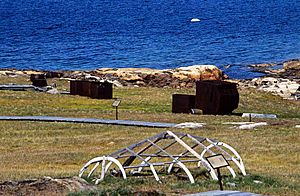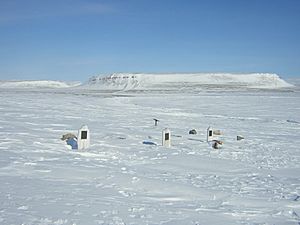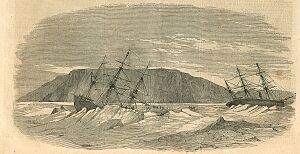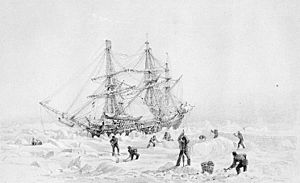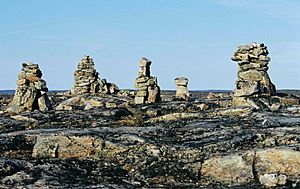List of National Historic Sites of Canada in Nunavut facts for kids
Nunavut is a huge territory in northern Canada, known for its amazing landscapes and rich history. It's home to many special places called National Historic Sites. These sites are like important landmarks that tell stories about Canada's past. In Nunavut, there are 12 of these special places. One of them is even part of a national park, managed by Parks Canada ![]() .
.
These sites help us remember important events and people from history. They are marked with special plaques. The names of these sites are chosen by the Historic Sites and Monuments Board.
Contents
Nunavut has many fascinating historic sites. Each one tells a unique story about the land and the people who have lived there for thousands of years.
Ancient Inuit Camps and Settlements
These sites show us how the Inuit people lived, hunted, and thrived in the Arctic for centuries.
Arvia'juaq and Qikiqtaarjuk
Located near Arviat, this site was a traditional summer camp for the Paallirmiut Inuit people. It's also an important archaeological site on Hudson Bay. It helps us understand the culture, spiritual beliefs, and way of life of the Inuit in this area.
Bloody Falls
Found in Kugluk/Bloody Falls Territorial Park, this area has archaeological remains from over 3000 years ago. It shows us how different groups, including Pre-Dorset, Thule, First Nation, and Inuit peoples, used this spot for hunting and fishing.
Fall Caribou Crossing
This part of the lower Kazan River in the Kivalliq Region was a key spot for hunting caribou for hundreds of years. It's a powerful symbol of the Inuit people's culture, spiritual connection, and economy in the region.
Igloolik Island Archaeological Sites
Igloolik Island is home to nine archaeological sites. These sites show 4000 years of human activity, from the Dorset and Pre-Dorset periods. It was also a wintering spot for explorer William Parry in 1821 and a base for the Fifth Thule Expedition in the 1920s.
Port Refuge
On the Grinnell Peninsula, this site has archaeological remains from prehistoric times. It includes a Thule winter village and older Pre-Dorset homes. There's even evidence that the Thule people had contact with the medieval Norse colonies in Greenland.
Whaling Stations and Early Contact
These sites show the impact of whaling and early meetings between Inuit and European explorers.
Blacklead Island Whaling Station
Established in 1860, this was a very important whaling station and wintering site in Cumberland Sound. It was active until the early 1900s. It's also a great example of an early contact-period Inuit village.
Kekerten Island Whaling Station
This whaling station in Cumberland Sound was set up in 1857. You can still see remains of the station, a burial ground, and a shipwreck. It represents the history of whaling in the Eastern Arctic and how it changed the economy and culture of the Inuit in the area.
Arctic Exploration and Shipwrecks
These sites tell the stories of brave explorers who ventured into the Arctic and the challenges they faced.
Beechey Island Sites
Beechey Island and Devon Island hold sites connected to Arctic exploration. This includes the winter camp of Franklin's lost expedition in 1845–46. Later, it became a base for search expeditions looking for Franklin's ships.
Wreck of HMS Breadalbane
Near Beechey Island, you'll find the wreck of HMS Breadalbane. This ship sank in 1853 while it was part of the search for Franklin's lost expedition. It's a fascinating underwater historic site.
Wrecks of HMS Erebus and HMS Terror
![]() These are the remains of HMS Erebus and HMS Terror, the two ships from Franklin's lost expedition in 1845–46. They are believed to have been trapped and wrecked by thick sea ice. The wreck of HMS Erebus was found in Wilmot and Crampton Bay in 2014, and HMS Terror was found in Terror Bay in 2016. This site is also part of the national park system.
These are the remains of HMS Erebus and HMS Terror, the two ships from Franklin's lost expedition in 1845–46. They are believed to have been trapped and wrecked by thick sea ice. The wreck of HMS Erebus was found in Wilmot and Crampton Bay in 2014, and HMS Terror was found in Terror Bay in 2016. This site is also part of the national park system.
Unique Cultural Landmarks
These sites highlight the creativity and ingenuity of the Inuit people.
Inuksuk Point
On the Foxe Peninsula, you can see about 100 inuksuit standing tall on a treeless headland. An inuksuk is a stone landmark or cairn built by the Inuit. These inuksuit are a testament to the cleverness and artistic skill of the Inuit people.
Kodlunarn Island
This island in Frobisher Bay has the ruins of a stone house, earthworks, and mining excavations. These are from Martin Frobisher's gold mining trips to the Canadian Arctic Archipelago between 1576 and 1578.
See also
 | Jackie Robinson |
 | Jack Johnson |
 | Althea Gibson |
 | Arthur Ashe |
 | Muhammad Ali |


